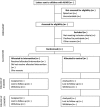Does the treatment of anxiety in children with Attention-Deficit/Hyperactivity Disorder (ADHD) using cognitive behavioral therapy improve child and family outcomes? Protocol for a randomized controlled trial
- PMID: 31722690
- PMCID: PMC6854614
- DOI: 10.1186/s12888-019-2276-3
Does the treatment of anxiety in children with Attention-Deficit/Hyperactivity Disorder (ADHD) using cognitive behavioral therapy improve child and family outcomes? Protocol for a randomized controlled trial
Abstract
Background: Up to 60% of children with Attention-Deficit/Hyperactivity Disorder (ADHD) meet diagnostic criteria for at least one anxiety disorder, including Social, Generalized and/or Separation Disorder. Anxiety in children with ADHD has been shown to be associated with poorer child and family functioning. Small pilot studies suggest that treating anxiety in children with ADHD using cognitive-behavioral therapy (CBT) has promising benefits. In a fully powered randomized controlled trial (RCT), we aim to investigate the efficacy of an existing CBT intervention adapted for children with ADHD and comorbid anxiety compared with usual care.
Methods: This RCT is recruiting children aged 8-12 years (N = 228) from pediatrician practices in Victoria, Australia. Eligibility criteria include meeting full diagnostic criteria for ADHD and at least one anxiety disorder (Generalized, Separation or Social). Eligible children are randomized to receive a 10 session CBT intervention (Cool Kids) versus usual clinical care from their pediatrician. The intervention focuses on building child and parent skills and strategies to manage anxiety and associated impairments including cognitive restructuring and graded exposure. Minor adaptations have been made to the delivery of the intervention to meet the needs of children with ADHD including increased use of visual materials and breaks between activities. The primary outcome is change in the proportion of children meeting diagnostic criteria for an anxiety disorder at 5 months randomization. This will be assessed via diagnostic interview with the child's parent (Anxiety Disorders Interview Schedule for Children V) conducted by a researcher blinded to intervention condition. Secondary outcomes include a range of child (e.g., anxiety symptoms, ADHD severity, behavior, quality of life, sleep, cognitive functioning, school attendance) and parent (e.g., mental health, parenting behaviors, work attendance) domains of functioning assessed at 5 and 12 months post-randomization. Outcomes will be analyzed using logistic and mixed effects regression.
Discussion: The results from this study will provide evidence on whether treating comorbid anxiety in children with ADHD using a CBT approach leads to improvements in anxiety and/or broader functional outcomes.
Trial registration: This trial was prospectively registered: Current Controlled Trials ISRCTN59518816 (https://doi.org/10.1186/ISRCTN59518816). The trial was first registered 29/9/15 and last updated 15/1/19.
Keywords: ADHD; Anxiety; Child; Efficacy; Randomized controlled trial; Treatment.
Conflict of interest statement
Ron Rapee is a developer of the Cool Kids program, but receives no royalties. Emma Sciberras is a member of the Editorial Board for BMC Psychiatry.
References
Publication types
MeSH terms
Associated data
LinkOut - more resources
Full Text Sources
Medical


